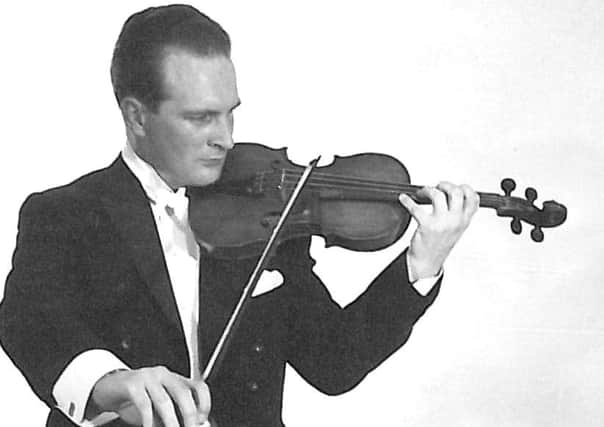Obituary: Philip Taylor, teacher and social scientist


Philip Taylor was head of the Economics and Modern Studies Department at George Watson’s College for 26 years. As a social scientist, he was one of the most gifted teachers of his generation.
Blessed with the finest intellect and an acute awareness of what education meant in its widest sense, Philip was never content with anything other than the highest academic standards – from both his pupils and his colleagues.
Advertisement
Hide AdAdvertisement
Hide AdEach was recognised as an individual in possession of talents which could provide for the greater good as well as for themselves, and there was never any acceptance that the subjects of Economics and Modern Studies should remain some remote adjunct of the sixth form curriculum as they did in many other schools. Instead, they were to be seen as an intrinsic part of the whole school curriculum and therefore worthy of the same degree of rigorous and organised study like any other core subject.
Likewise, the Political Economy Society, which developed so successfully under Philip’s guidance, was an important whole-school activity through which pupils from all departments of the school could debate with public figures, ranging from former prime ministers and Nobel prize-winning economists to distinguished captains of industry and entrepreneurs.
Born in Middlesex and educated at Isleworth County High School and the London School of Economics, Philip taught in both Yorkshire and London before arriving at Watson’s in 1972. It was immediately obvious that the school had employed a first class teacher whose concern for his subjects and his pupils’ pursuit of them went far beyond ordinary classroom activity.
Success in examinations was an important priority – his achievements in this regard speak for themselves – but there was no obsession with paper qualifications. Instead there was the constant striving for new ideas and different perspectives within the department, within the school, and indeed within the development of the subjects across Scotland. Sometimes, he courted controversy, usually because he was ten steps ahead of everyone when he wanted his department, or the school, to adopt a new idea. At times, this brought him into conflict with colleagues, including headmasters, but all the time, beneath the surface, there was a man who cared deeply for Watson’s and all that it stood for. He would be the first to admit that he did not really enjoy some aspects of administration most especially those which accompanied the so-called “proactive” teaching styles of the 1990s which involved endless evaluations and assessments.
Advertisement
Hide AdAdvertisement
Hide AdHis unease (and that of his typewriter which always appeared to be missing several keys!) when being asked to fill in tedious forms was testament to his belief that there were always more important things to be done – tasks which required a depth of insight and knowledge which were far removed from the mundane bureaucracy of the examination board.
Working with Philip was therefore always a colourful and challenging experience, but immensely rewarding because it was accompanied by an acute sense of fun which prevented the serious aspects of teaching from becoming too dominant.
For many colleagues the presence of “Taylorisms” in the staff common room made even the dullest occasion seem bearable. Read PT’s “footnotes” to official papers or minutes and you will have a full record of his wit. Examine his case studies – of Adam Smith or Thomas Malthus, of Kalmar or Kodak or Polly Peck (very important for the theory of elasticity!) and you saw why economics was so central to the way things worked. Look at his diagrams and you had a unique collection of the main principles of economic thinking. Watch him teach and you knew you had witnessed something special.
If Watson’s appointed an excellent economist in 1972, it also appointed an outstanding musician. Indeed, such were Philip’s talents in this direction that school-mastering had to fight alongside the possibility of pursuing a career with a professional orchestra. Those members of the Edinburgh Symphony Orchestra and the Watson’s Chamber Orchestra, alongside whom he played on a very regular basis, will all tell you just how important his influence was on their own musical careers. So too, would the members of the Edinburgh Players’ Opera Group which Philip set up to allow amateur musicians to play alongside professional singers. The fact they could put on the whole Ring Cycle spoke volumes about the musical regard in which he was held. A man with so many strings to his bow.”
Advertisement
Hide AdAdvertisement
Hide AdNeither was he short on sporting interest, most especially if it meant watching his beloved Middlesex at Lords. On long, hot summer days, either on the school’s lawns or on those of his family homes in Newington and latterly in Whittingehame, Philip could be found beside his “wireless”, tuning in to the gravelly tones of John Arlott or the school-boyish humour – very similar to his own – of Brian Johnston on Test Match Special.
Philip was, at heart, always a family man. Devoted to his wife Bridget and their three children, Natalie, Beatrice and Julian, he liked nothing better than their company and that of his grandchildren. He will be greatly missed by them and by countless pupils and colleagues at Watson’s but we can all rejoice in his inspiration.